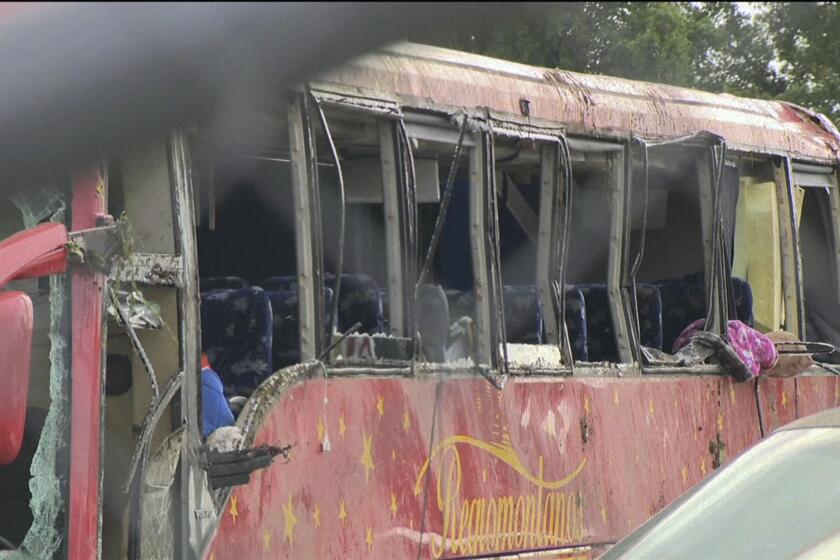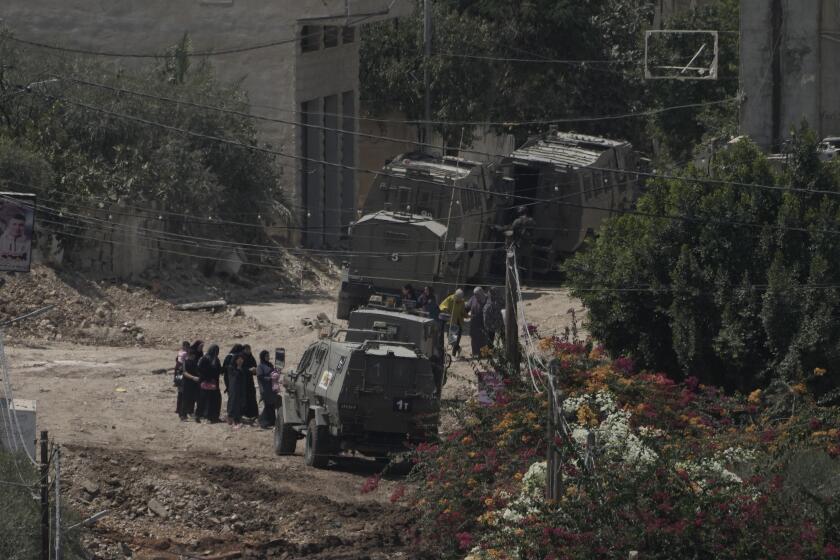Ethnic Discord : Radio Buffs Keep Bosnians in Touch : Operators in Croatia contact lost relatives in war zones and gather news from the battlefront.
Refugees reverently appear at the door of Enes Boric’s radio room beneath this capital city’s mammoth central mosque, clutching tiny scraps of paper with meticulously copied telephone numbers.
With nowhere else to turn, they beg Boric to use his network of ham radio operators to help them contact relatives in Srebrenica, Zenica, Tuzla and other besieged communities in Bosnia-Herzegovina, hoping to learn anything about their families’ fate. War has transformed these radio buffs, who use only first names or call letters on the air, into a lifeline for villages cut off from the outside world by rugged geography and military campaigns.
“We, too, are soldiers--only we are not in our own country,” says Boric, a displaced Bosnian Muslim. “This is a way for us to still be involved in the war.”
Boric’s radio waves touch inaccessible areas devastated by fighting, such as the supposedly “safe area” of Srebrenica. He swings into his daily conversation with “Ibrahim,” his contact there, with the speed of an auctioneer, speaking so quickly that his colleague asks him to repeat his messages several times. Though the connection is faint and obstructed by static, Boric manages to tick off a dozen messages and phone numbers in under three minutes.
Just as he prepares to launch a new wave of inquiries, the static rises. Boric continues anyway until a piercing screech and whirring sound interrupts the signal--an indication that hostile Serbian forces surrounding the enclave have intercepted their conversation. Boric scrambles to alter the frequency, screaming into his microphone that Ibrahim should follow suit. Then the conversation resumes.
“Your ability to change frequencies indicates how good of an operator you are,” Boric tells a visitor with a smile.
Boric, 30, began dabbling with ham sets when he was 15 and learned still more during a stint in the Yugoslav army long before the present conflict.
He and other operators in the Zagreb mosque basement speak regularly with more than 100 fellow radio-enthusiasts-turned-heralds in dozens of cities throughout Bosnia, handling about 1,000 messages a month between refugees and loved ones.
Boric himself escaped to Zagreb after his home village of Odzak fell to Serbian control. Like thousands of other Bosnian refugees, forced from their homes since fighting broke out last year, he turned to the mosque for help and information. He quickly became a key cog in the communications network.
Though fighting has disrupted regular telephone service between Bosnia and Croatia, ham radio operators can often serve as intermediaries. “Sabina,” a ham operator in Zenica, for example, will take a message relayed by Zagreb and use her own phone to attempt a local call to the intended recipient.
If she succeeds, she radios back to Zagreb with the reply. At the mosque, the news is entered into a laptop computer. If the local phone lines are down, the message waits until they are repaired.
The mosque and private donors cover the cost of the venture, including the $9,000 monthly telephone bill, equipment and a small monthly salary for Boric and some of the other operators.
Desperate, refugees will leave messages and often return several times to the tiny, basement radio room before they receive any reply. Sebiha Jakupovic, 30, a refugee from Kozarac, hopes for news about her brother, Munib Bahongic.
“No one has seen him since (Serb forces) took him away,” she says, straining to hold back tears. “If only he is alive. We have heard nothing.”
Svada Numanovic also has little to do but wait. The 38-year-old refugee from Teslic, a village about 40 miles from the Bosnian enclave of Tuzla, fled more than a year ago, leaving behind three brothers and three sisters. After three months with no news from them, Numanovic trekked to the radio room as a last resort. Clearly flustered by the trip across a city far more complicated than her native village, and frightened by the escalating war, the shaken Numanovic needs several minutes before she is able even to speak the names of her siblings.
“I don’t even know if they are alive,” she says. “I would like to know something. Just to know.”
For his 12-hour days, Boric earns 100 German marks monthly. Many operators take no pay at all. They often sleep in the basement radio room--just in case a call comes in overnight. Boric pads about the tiny office in his stocking feet, downing espresso and fighting off fatigue. The long hours and crisis atmosphere have worn nerves thin.
But there are other compensations. Boric, for example, was able to arrange a conversation between a refugee receiving medical care in the United States and the child’s sister in Srebrenica.
The ham operators say they generally try to keep their distance from those they attempt to help.
“I hate dealing with the people,” says Albert Terzic, 27, another ham operator, as he nodded sadly toward a cluster of refugees waiting outside the door. “So many times they are hoping for too much. It’s really hard for me to tell people that their relatives are dead.”
Another ham radio operator is Pavle Parigros, a 64-year-old retired actor who now works for the Zagreb bureau of Oslobodjenje, the Sarajevo daily newspaper that continues to publish despite overwhelming odds in the besieged Bosnian capital. Through the silver-haired Parigros and his wife, Vilma, who assists him, the newspaper is able to pass along reports from peace conferences in Geneva or the United Nations in New York.
“We have no other way to get information to Sarajevo, and for them to get information to us,” says Josip Vricko, a Zagreb-based editor of Oslobodjenje. “Without (the ham operators), the newspaper wouldn’t come out.”
Hunched over his microphone, constantly adjusting a radio dial to minimize interference from helicopters and a thunderstorm, Pavle Parigros tries to maintain contact with Pajo, his contact at Oslobodjenje in Sarajevo. Flipping switches and twisting knobs, he presses on, telling Pajo that he hopes a friend code-named Santa Claus will be bringing in supplies.
The situation in Sarajevo is deteriorating. “We have no flour. No electricity. No water. Nothing,” Pajo screams over the static.
The story is familiar to Parigros. He fears that soon, even the radio link will be severed, as more ham operators lose electricity.
“Everyone has had enough of this,” Parigros says. “We have to help, but it is hard for me to hear how desperate things are.”
Parigros keeps a small black binder, which lists the 2,000 requests he’s received in the last 10 months from Australia, Canada, Switzerland, Libya, Germany and other nations. Their telephone number, Vilma Parigros explained, has been passed around among refugees scattered around the globe--refugees who call, often in the middle of the night, and keep calling until an answer is received.
Pavle Parigros records the incoming radio messages on a cassette player, then carefully enters them in the binder with the query in blue ink and the answer in red. On this day, he enters a note he’ll pass onto a caller from Germany. “He will call tonight,” Pavle Parigros said quietly, “and I’ll have to tell him that his brother is dead.”
But the Parigroses, as well as the operators of the mosque station, insist they will continue, despite the physical and emotional toll.
“He does this for love,” Vilma Parigros says. “He cries a lot. . . .”
Sometimes, both admit, the Parigroses and others clustered around the radio all cry together.
More to Read
Sign up for Essential California
The most important California stories and recommendations in your inbox every morning.
You may occasionally receive promotional content from the Los Angeles Times.






